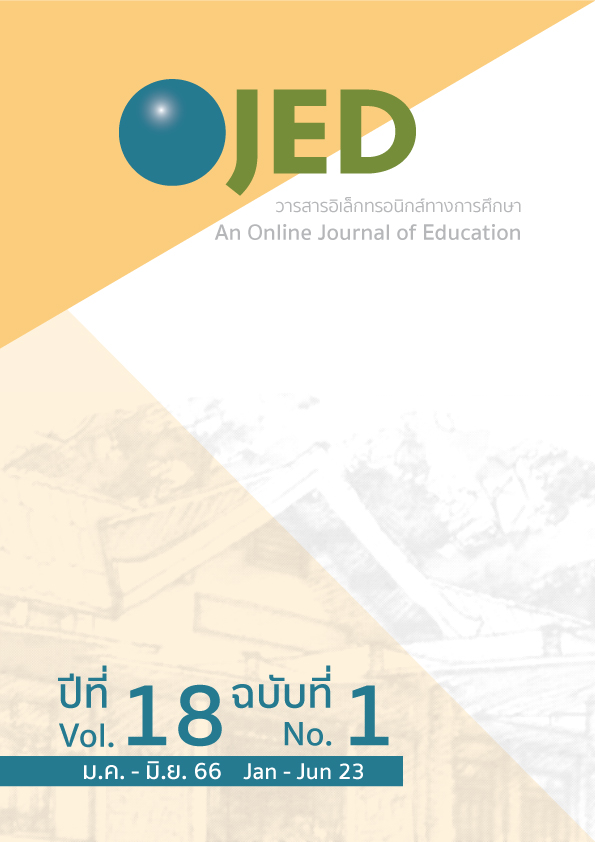The Effect of Organizing Learning Activities using a Realistic Mathematics Education Approach and Metacognitive Questioning on Mathematics Critical Thinking of Tenth-grade Students
DOI:
https://doi.org/10.14456/ojed.2023.1Keywords:
realistic mathematics education approach, metacognitive question, mathematics critical thinkingAbstract
This research is a quasi-experimental research study on the mathematical critical thinking ability of students learning by organizing activities using a realistic mathematics education approach and metacognitive questions. The objectives of this research were 1) to compare the mathematical critical thinking ability of tenth-grade students before and after learning those activities and 2) to compare the mathematical critical thinking ability of students after learning with 60 percent of the full score. The sample consisted of 36 tenth-grade students from a school in Chumphon Province. The experimental instrument was lesson plans based on a realistic mathematics education approach and metacognitive questions. The data collection instruments were the pre–test, and post–test of the mathematics critical thinking ability. The data were analyzed by average, standard deviation, and t-test. The results showed that 1) the mathematics critical thinking ability of tenth-grade students after learning by organizing activities using realistic mathematic education and the metacognitive question was higher than that of the student before learning at a .05 level of significance, and 2) the mathematics critical thinking ability of tenth-grade students after learning was higher than 60 percent of criteria at .05 level of significance.References
ภาษาไทย
ประพันธ์ศิริ สุเสารัจ. (2551). การพัฒนาการคิด. กรุงเทพฯ: 9119 เทคนิคพริ้นติ้ง.
ผกาทิพย์ รันสูงเนิน. (2557). ปัจจัยเชิงสาเหตุที่ส่งผลต่อความสามารถในการแก้ปัญหาคณิตศาสตร์ของนักเรียนชั้นมัธยมศึกษา
ปีที่ 3. สำนักงานเขตพื้นที่การศึกษา เขต 1 (Doctoral dissertation).
ธัญพิมล จันทร์นุ่ม. (2558). ผลของการจัดกิจกรรมการเรียนรู้ตามแนวการศึกษาคณิตศาสตร์ที่สอดคล้องกับชีวิตจริงร่วมกับ
การพัฒนาความคิดเด็กที่มีต่อความสามารถในการให้เหตุผลทางคณิตศาสตร์และความสามารถในการสื่อสารทาง คณิตศาสตร์ของนักเรียนระดับชั้นมัธยมศึกษาปีที่ 2. [วิทยานิพนธ์ปริญญามหาบัณฑิต, จุฬาลงกรณ์มหาวิทยาลัย]
สกล สุวรรณาพิสิทธิ์. (2555). ทักษะแห่งอนาคตใหม่ : การเรียนรู้ในศตวรรษที่ 21 คืออย่างไร เข้าถึงได้จาก http://
www.qlf.or.th/Home/Contents/417.
สถาบันส่งเสริมวิทยาศาสตร์และเทคโนโลยี. (2018). ผลการประเมิน PISA 2018 การอ่าน คณิตศาสตร์ และวิทยาศาสตร์.จัดพิมพ์และเผยแพร่โดยสถาบันส่งเสริมการสอนวิทยาศาสตร์และเทคโนโลยี (สสวท.).
สุคนธ์ สินธพานนท์. (2552). นวัตกรรมการเรียนการสอนเพื่อพัฒนาคุณภาพของเยาวชน. พิมพ์ครั้งที่ 3. กรุงเทพมหานคร: 9119 เทคนิคพริ้นติ้ง.
สำนักงานเขตพื้นที่การศึกษามัธยมศึกษาหนองคาย. (2563). รายงานผลการทดสอบการศึกษาระดับชาติขั้นพื้นฐาน (O-NET). เข้าถึงได้จากhttps://www.sesaobk.go.th/wpcontent/uploads/ 2021/08/%E0%B8%A3%E0% B8%B2 %E0% B8%A2%E0%B8%87%E0%B8%B2%E0%B8%99%E0%B8%A1.6_-63.pdf
แสงดาว ถิ่นหารวงษ์. (2558). การเรียนรู้แบบมีส่วนร่วม: จากทฤษฎีสู่การปฏิบัติในรายวิชา วรรณคดีสำหรับเด็ก. วารสารมนุษยสังคมปริทัศน์, 17(1), 1-11.
อุษณีย์ โพธิสุข. (2537). วิธีการสอนเด็กปัญญาเป็นเลิศ. เอกสารประกอบการสอน กพ. 554. กรุงเทพฯ: ภาควิชาการศึกษาพิเศษ.
ภาษาอังกฤษ
Anastasi, A. (1982). Psychological Testing5thed. New York: Macmillan
Carlo Magno. (2010). The role of metacognitive skills in developing critical thinking. Metacognition and learning, 5(2), 137-156.
Choy, S. C., & Cheah, P. K. (2009). Teacher perceptions of critical thinking among students and its influence on higher education. International Journal of Teaching and Learning in Higher Education, 20(2), 198-206.
Freudenthal, H. (1971). Geometry between the devil and the deep sea. In The teaching of geometry at the pre-college level (pp. 137-159). Springer, Dordrecht.
Henningsen, M., & Stein, M. K. (1997). Mathematical tasks and student cognition: Classroom-based factors that support and inhibit high-level mathematical thinking and reasoning. Journal for Research in Mathematics Education, 28(5), 524-549.
Intaraprasert, P. (2010). Factors Affecting Learning Achievement of Matthayomsuksa6 student in Satreeprasertsin School under The Office of Trat Educational Service Area.Chonburi: Burapha University. (in Thai)
Lange, J. D. (1996). Using and applying mathematics in education. In International handbook of mathe matics education (pp. 49-97). Springer, Dordrecht.
Lestari, W. (2018). Enhancing an Ability Mathematical Reasoning through Metacognitive Strategies. Journal of Physics: Conference Series (Vol. 1097, No. 1, p. 012117). IOP Publishing.
Kramarski, B., & Mevarech, Z. R. (1997). Cognitive metacognitive training within a problem‐solving based Logo environment. British Journal of Educational Psychology, 67(4), 425-445.
Kramarski, B., & Mevarech, Z. R. (2003). Enhancing mathematical reasoning in the classroom: The effects of cooperative learning and metacognitive training. American Educational Research Journal, 40(1), 281-310.
Seher, S. M., & Kendir, F. (2013). The effect of using metacognitive strategies for solving geometry problems on students achievement and attitude. Educational Research and Reviews, 8(19), 1777-1792.
Downloads
Published
How to Cite
Issue
Section
License
Copyright (c) 2023 An Online Journal of Education

This work is licensed under a Creative Commons Attribution-NonCommercial-NoDerivatives 4.0 International License.




